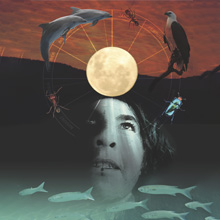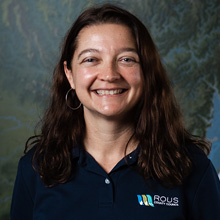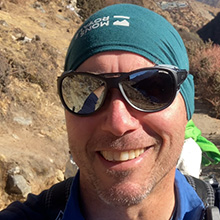KEYNOTE SPEAKERS

Dr Chels Marshall
Read Biography
Dr Chels Marshall is a cultural systems ecologist belonging to Gumbaynggirr Jagun from the Baga Baga/Ngambaa (Northern NSW). Dr Marshall is a Researcher at the University of Tasmainia NESP. An associate of the Indigenous Knowledges Systems (IKS) Lab of the NIKIRI Institute Deakin University. Implementing cultural ecological knowledge and First Nations science frameworks to create virtual and physical environments for sharing knowledge through art, science and Indigenous metaphysics.
She has extensive experience in environmental science and marine science and management a PhD, Traditional Knowledge Systems and climate change in the Pacific, International Governance (Australian National University). She holds a Masters in Marine Science and Management at the National Marine Science Centre /University of New England on Spatial Analysis of Indigenous Marine Associations in Gumbaynggirr Nation. Chels also has Degrees in Wildlife Management and Cultural Resource Management.
Chels has worked as a Protected Area manager within the NSW and Australian Government for 28 years in private land conservation, coastal marine, karst, wildlife management, policy and protection development assessment, operations and co-operative and integrated cultural landscape management. Over 28 years Chels has also been actively involved locally and nationally in increasing the capacity of Aboriginal people to participate in land & Sea Country management, planning, research and monitoring.
Chels also sits on a number of councils that provide advice, analysis and direction to Aboriginal people, the Australian Government and Senior Management and environmental sectors regarding policy, legislation and initiatives that affect biodiversity, Aboriginal cultural values, providing advice and analysis on the Ecological and Cultural values of marine and terrestrial estate as it relates to technical, ecological, and cultural engagement of Aboriginal people and associated cultural values and issues.

Chrisy Clay
Read Biography
For 26 years, Chrisy Clay has been a constant presence on the floodplains of the Northern Rivers. Across roles in local and state government, Southern Cross University, and NGOs, she’s worked to address complex issues like acid sulfate soils and blackwater – both which significantly impact estuarine health.
Throughout her career, she’s prioritised building trusted relationships with landowners, the sugar cane industry, oyster growers, and fishers. Her technical expertise, deep local knowledge, and hard-earned experience, especially in the Richmond, have earned her widespread respect. Chrisy has focused much of her career on floodplain drainage, the water quality issues it can generate and the downstream impacts on estuaries.
Now Flood Mitigation Manager at Rous County Council, Chrisy leads with heart and pragmatism, balancing the challenges of historical floodplain infrastructure with a focus on real, long-term outcomes. This year, her dedication was recognised nationally as a finalist for the FMA Allan Ezzy Flood Risk Manager Award.
Chrisy’s vision is for the Richmond floodplain to be a showcase of sustainable floodplain land use—where productive floodplain agriculture and a healthy estuary thrive side by side. She remains hopeful this future can be realised in her lifetime.

Professor Scott Johnston
Read Biography
Professor Scott Johnston is an environmental hydro-biogeochemist based at Southern Cross University, where he is co-lead of the Catchments, Coasts and Communities Research cluster. His research is focused on processes that control water quality in natural landscapes, including wetlands, coastal floodplains and shallow aquifers to head-water streams and major river systems. His research integrates across scales spanning the mineral-water interface to the sub-catchment and often explores the cycling, speciation, behaviour, transformation and transport of major redox-sensitive elements (i.e. Fe, S, C) and various co-associated toxic trace elements (e.g. As, Sb, Al) in surface waters, groundwaters and sediments.
He has implemented multiple large-scale, multi-disciplinary research projects (ARC / CRC) in collaboration with industry, state and local governments. Many of these projects have focused on developing, assessing and refining practical techniques for improving water quality and remediating degraded estuarine and freshwater wetlands with acid sulfate soils.
Recent investigations include citizen science / community collaborations focused on river water quality, as well as improving our understanding of the cryptic role of trees in the global methane cycle.

Marlon Denning
Read Biography
Marlon Denning is a local student passionate about inspiring respect and care for the environment and its creatures. In 2021, he created his first film, The Rock Pool Waltz, which tells the story of how his connection with nature helped ease his worries and loneliness during the COVID lockdown, leading to an extraordinary friendship with an octopus. Over the past four years, the film has toured environmental festivals and schools worldwide, earning more than 20 awards while raising awareness about the importance of our connection with nature.
Download Marlon’s awards list (PDF File)
